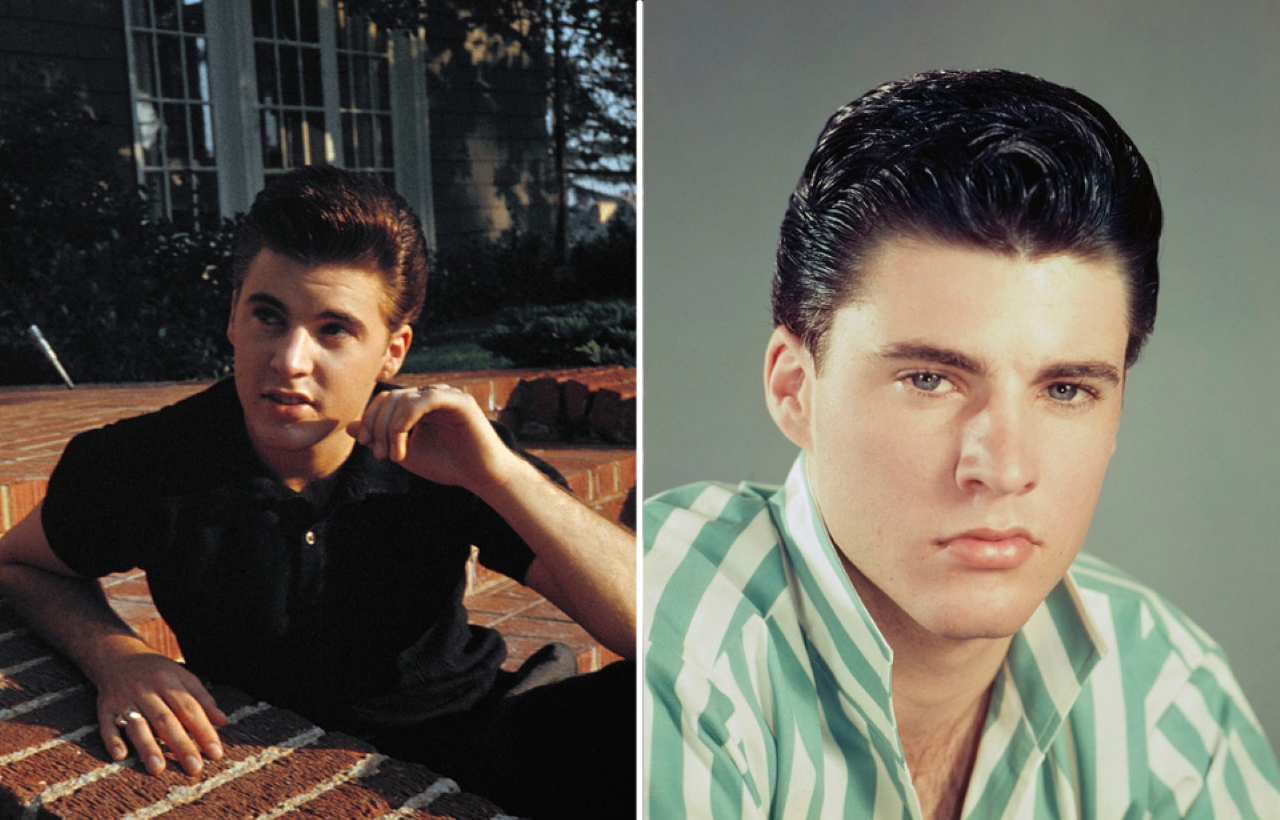🌱 A Teen Idol Born from Simplicity
In the late 1950s, the world of rock & roll was filled with sweat, swagger, and spectacle. Elvis Presley shook his hips with electrifying energy. Jerry Lee Lewis pounded the piano like a man possessed. Chuck Berry duck-walked across the stage, turning every performance into a riot of joy.
And then there was Ricky Nelson.
He didn’t scream. He didn’t move much. He didn’t even seem to try. Standing still with his guitar, his dark hair perfectly combed, he simply sang. His voice was cool, calm, and unhurried—yet the effect on audiences, especially young women, was explosive.
Ricky Nelson became the first true teen idol not because he was loud or wild, but because he was the opposite. His style was quiet, natural, and effortless.

📺 Growing Up in America’s Living Room
Part of Ricky’s effortless image came from where America first met him: television. He grew up on The Adventures of Ozzie and Harriet, the sitcom starring his real family. By the time Ricky was 17, millions had already seen him every week in their living rooms.
Unlike other rock stars who had to break into the public consciousness through controversy or scandal, Ricky was already “one of the family.” He looked like the boy next door. When he first sang on the show, his audience didn’t see a rebel—they saw someone familiar, someone safe.
That natural, unforced charm was his secret weapon. He didn’t have to become a teen idol. He already was.
🎸 The Calm in the Storm of Rock & Roll
Musically, Ricky Nelson’s style stood out for its restraint. While others pushed volume and speed, Ricky leaned into melody. His hits like “Poor Little Fool” and “Lonesome Town” were delivered with an almost whispered intimacy.
The most striking example came with “Travelin’ Man” in 1961. Sung with his trademark cool detachment, it told the story of a young man who had lovers around the world. What could have been a brash, cocky anthem became instead a smooth, breezy confession. Ricky didn’t brag—he simply stated it, and that quiet confidence made it irresistible.
Fans believed him not because he shouted, but because he didn’t need to.
😎 The Look That Defined an Era
Part of Ricky’s effortless appeal was visual. He never overdressed. His hair, styled but never flamboyant, seemed naturally perfect. His clothing choices were clean, classic, and accessible—button-down shirts, slim trousers, jackets. He looked like someone you might actually meet in a diner, not an untouchable star.
In an era where image was everything, Ricky’s image worked because it was understated. His quiet style gave teenagers something they could aspire to. Boys copied his hairstyle. Girls fell for his serious eyes and soft smile.
Elvis might have been the King, but Ricky was the boy next door who somehow felt even closer.
🕺 The “Effortless” Idol
The phrase “effortless idol” followed Ricky throughout his career. It described not just his looks or his music, but his entire demeanor. He rarely spoke loudly, rarely made big statements. Even on stage, his movements were minimal, almost shy.
But that shyness became part of his mystique. Fans didn’t want him to be wild—they wanted him to be Ricky: calm, collected, and quietly cool.
He wasn’t selling rebellion. He was selling sincerity.
🎤 A Star Who Didn’t Want to Pretend
Ricky himself was aware of this image. In interviews, he often admitted that he didn’t like showmanship for its own sake. He wanted the music to speak, not the performance. That philosophy made him stand apart in a decade when being bigger and louder seemed like the rule.
This attitude also showed in his songwriting later. With “Garden Party” (1972), he openly rejected the idea of being forced into playing his old hits for nostalgia’s sake. His quiet rebellion was not in breaking guitars or screaming at audiences—it was in quietly insisting on authenticity.
💔 The Cost of Being Effortless
Yet the same qualities that made Ricky beloved also worked against him. In the 1960s, when the Beatles and Rolling Stones brought raw energy and charisma to the stage, Ricky’s understated style began to seem out of step. Critics called him “too soft,” forgetting that his cool restraint was exactly what had once made him revolutionary.
But Ricky never abandoned his quiet style. He never tried to become someone else just to fit in. That stubbornness, though it cost him chart positions, preserved his identity. Fans who stayed with him appreciated that he never faked it.
🌹 The Legacy of Quiet Cool
Looking back today, Ricky Nelson’s “effortless idol” image feels timeless. Long before minimalism became fashionable, Ricky embodied it. He proved that you don’t have to shout to be heard, or move wildly to be seen.
His quietness was not weakness. It was strength.
Modern artists who favor understatement—singers who let subtle emotions carry their songs—owe a debt to Ricky Nelson. His influence stretches from folk-rock balladeers to smooth pop icons who understand the power of less.
🎶 The Sound of Subtle Perfection
Perhaps the best way to understand Ricky’s effortless idol status is to listen again to “Travelin’ Man.” At first, it seems simple, even too light. But listen closely: the way his voice floats over the melody, unhurried, confident, and unforced, captures everything about him.
No theatrics. No drama. Just Ricky, being Ricky.
That’s why he was—and remains—the idol who didn’t need to try.